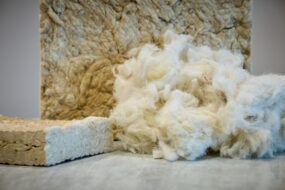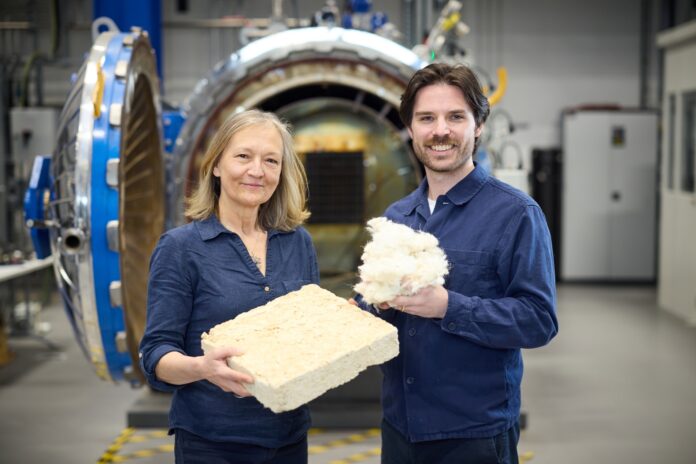new venture which is pioneering the development of rigidinsulation panels made from sheep wool is set to scale up after securing a £300,000 investment boost.
Wull Technologies, a joint venture between Manchester-based Vector Labs and Wool Insulation Wales, has received backing from the University of Manchester Innovation Factory and Greater Manchester Combined Authority’s GM Advance fund. Each has invested £150,000 in the business.

It is the latest ‘spin-in’ company to gain funding support from the University of Manchester Innovation Factory, following input from university academics into the development of LAMDA, the brand name for its rigid wool fibre panels.
A ‘spin-in’ is an existing company which partners with a university or research institution to leverage resources in order to accelerate growth and innovation, in contrast to a ‘spin-out’, where a business is created from university research.
The funding will enable Wull Technologies to commercialise LAMDA. The panels are being manufactured in Manchester using Welsh mountain sheep wool and a patent-pending greenchemistry process developed by Vector Labs’ material scientists.
Wull Technologies team has now secured more than £500,000 in backing so far, following a grant of £214,000 fromInnovate UK’s Resource Efficiency for Materials and Manufacturing (REforMM) programme for its initial research project in 2023.
Vector Labs is based at Manchester’s Graphene Engineering Innovation Centre and is the technology division of Vector Group. The group includes Vector Homes, which uses sustainable and advanced materials in its low-carbon, affordable, energy-efficient building systems designed for rapid construction and assembly.
Wool Insulation Wales, based in Neath Port Talbot, was founded in 2022 by Ruth-Marie Mackrodt and Mair Jones. It turns Welsh sheep wool into loft insulation rolls distributed under the brand name Truewool.
Ruth-Marie heads Wull Technologies as commercial directoralongside Liam Britnell as technical director.
The partnership came about following Vector Homes’ development of its flatpack, rapid-build show home at the University of Salford’s Energy House 2.0.
Liam said: “Wool Insulation Wales brought sheep wool to our attention. Welsh mountain wool is naturally insulative, breathable and fire-retardant. However, farmers lose money on every sheep sheared. Together, we set out to use materials science to open up new markets for this abundant and underutilised material.
“Rigid panel insulation is widely used and preferred across the construction sector because it is easy to handle, install and cut to shape.
“To our knowledge, there is no rigid wool panel product on the market in the UK, and many natural fibre alternatives use a plastic binder.
“Our scientists have developed a patent-pending process to create rigid sheep wool panels without adding any plastics. This ensures that LAMDA panels are recyclable, biodegradable and provide a sustainable alternative to mineral wool insulation, which is derived from high-energy mining processes.
“LAMDA competes with mineral wool in thermal and acoustic performance while offering superior moisture management, making it ideal for retrofitting heritage buildings where breathability is essential, and for preventing damp in homes, an issue which the UK Health Security Agency has said affects over two million people in England alone.”
Liam added: “What is additionally exciting is how this material could be applied across sectors beyond construction. We’ve been overwhelmed with interest and positive feedback from sectors including packaging, horticulture and interior design.”
The Wull Technologies joint venture sees Vector Labs leading on the research, development and manufacturing, and Wool Insulation Wales contributing its extensive sector expertise.
Ruth-Marie said: “The retrofit challenge presents a huge opportunity to invest in circular economies built around local supply chains and natural materials.
“With many millions of kilograms of wool produced annually in the UK as a byproduct of sheep farming, WullTechnologies provides an innovative and new market for it.
“The biophilic look and feel of LAMDA also makes for a refreshing change from the plastics that dominate our built environment.
“We’re incredibly grateful to both the Greater Manchester Combined Authority and the University of Manchester Innovation Factory for their support. Their investment means we can now move forward to the next stage of development and begin scaling up for full commercialisation.”
Nic Gowland, senior investment and licensing manager at the University of Manchester Innovation Factory, said: “We’ve helped facilitate collaborative input from academic experts into the materials science behind LAMDA, ensuring the product is grounded in cutting-edge research.
“We’re delighted to formalise our partnership with WullTechnologies and to be part of the company’s journey as it grows and continues to innovate in future.
“Through this partnership and continued engagement with the university and Innovation Factory, we’re confident the company can become a major player in the application of sustainable materials across multiple industries.”
The GM Advance fund, established as part of Greater Manchester’s Investment Zone, supports the growth of companies in the advanced materials and manufacturing sector.







